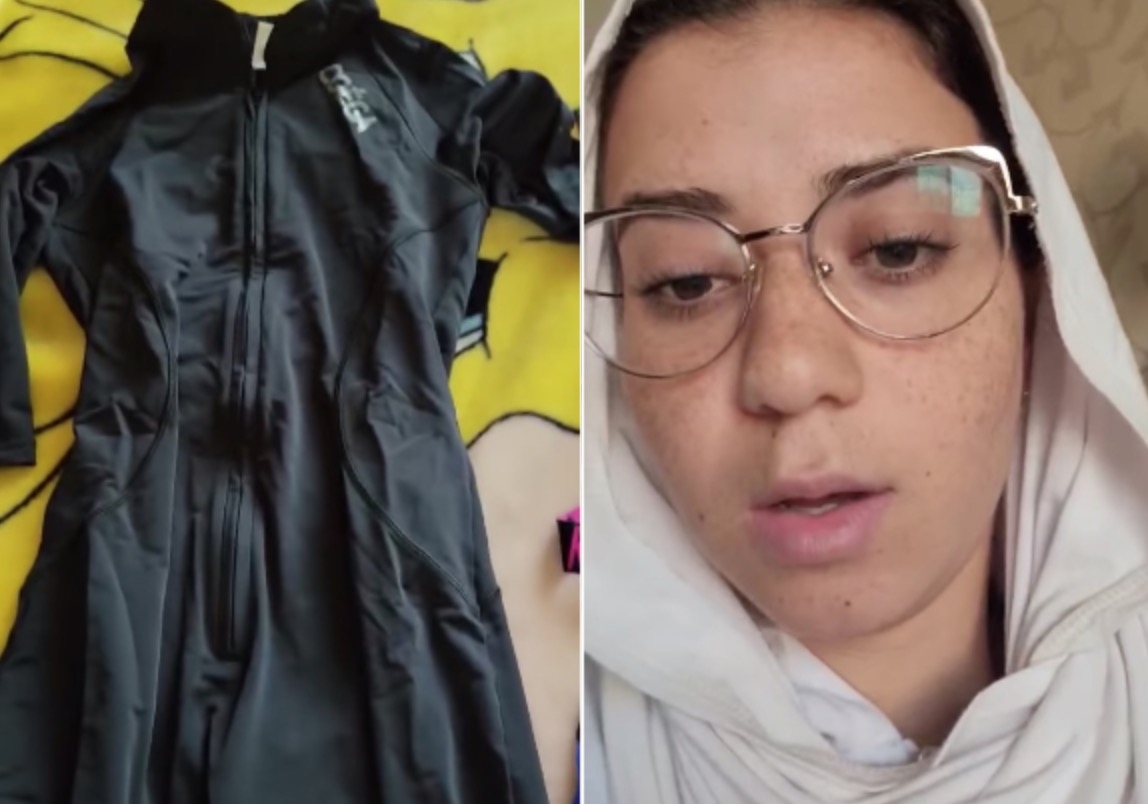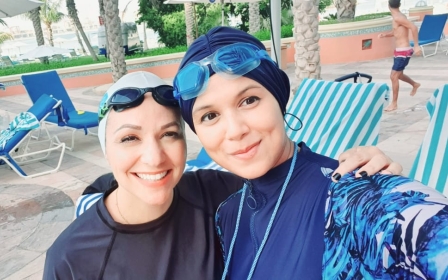Egypt: Outpouring of support for woman barred from sports club over modest swimwear

A viral video posted by an Egyptian woman outlining discrimination she faced at a Cairo sports club for wearing a modest swimsuit has sparked condemnation online of regulations at many resorts in the country.
Dina Hisham posted a video to Facebook on Friday, saying she was denied entry to Giza’s Palm Hills Club pool because of her choice of swimwear.
In the video, Hisham showed her swimsuits - ranging from a bikini to a one-piece to a fully covered swimsuit - as she tearfully explained that she had been denied access to the pool because she planned to put on modest swimwear.
'Why is drinking, going out and doing what you want, speaking English or French to appear high class okay, but choosing to wear what you want and dress modestly, also like the West, not okay?'
- Dina Hisham
“Enough. Enough of crushing us. I’ve never experienced this in Canada, that my hijab was an issue. I lived in Canada for ten years and in Egypt for one, and I’ve never felt pressure to take off my hijab in Canada,” she says. “In Canada everyone was accepting and supportive of what I believe in."
Hisham said the treatment she has faced in Egypt was vastly different.
New MEE newsletter: Jerusalem Dispatch
Sign up to get the latest insights and analysis on Israel-Palestine, alongside Turkey Unpacked and other MEE newsletters
"Why is drinking, going out and doing what you want, speaking English or French to appear high class okay, but choosing to wear what you want and dress modestly, also like the West, not okay?” she added.
Hisham explained that she felt overwhelming pressure to conform to certain ways of dressing, which included wearing more revealing clothing, whereas covering up was less accepted.
The burkini, a name given to modest swimwear, is favoured by many Muslim women and people who choose to dress modestly - but it is banned in many private hotels and resorts in Egypt.
Hisham's video has garnered widespread support from social media users, and has been shared over 3,000 times.
Translation: There are two completely opposite cases both occupying public opinion now - one is Habiba Tarek, who was bullied for wearing a dress above her knee, and the other is Dina Hisham, who was not allowed to wear a burkini. Welcome to the quagmire of double standards.
Many have used the incident to highlight double standards in the country, particularly regarding the policing of women’s clothing and behaviour.
Translation: One wore a dress and took off her hijab, and people humiliated her, the other wore a covered up swimsuit and hijab and people humiliated her too. People will stay like this and won’t change, this is not something new or strange in our country.
Translation: When a girl wears a dress and is not veiled she gets bullied, and when a girl wears a full swimsuit she is denied entry from security. There is a hidden camera, right?
Last year, an Egyptian woman was also harassed for wearing modest swimwear at a swimming pool in the country’s north coast. The incident caused widespread outrage on social media.
Egypt’s tourism ministry has previously come under fire from many people in the country after rescinding a decision stating that the burkini should not be banned.
The decision was met with anger, as many women voiced their concerns about discrimination and an infringement on their personal choices and freedoms.
Earlier this month, the sentencing of two TikTok content creators also dominated public discourse in Egypt, after they were convicted of human trafficking and violating societal values.
The two young women, Mawada al-Adham and Haneen Hossam, regularly posted videos of themselves singing and dancing online, as well as taking part in other viral trends.
Human rights experts and journalists have argued that Egypt’s use of cybercrime laws unfairly targets women, and is regularly used to crack down on working-class women.
Many critics have also called for reform of Egypt’s cybercrime law, and greater understanding of how social media platforms are monetised, as well as clarifying "vague" laws that do not specifically define what violates family or societal values.
Middle East Eye delivers independent and unrivalled coverage and analysis of the Middle East, North Africa and beyond. To learn more about republishing this content and the associated fees, please fill out this form. More about MEE can be found here.




